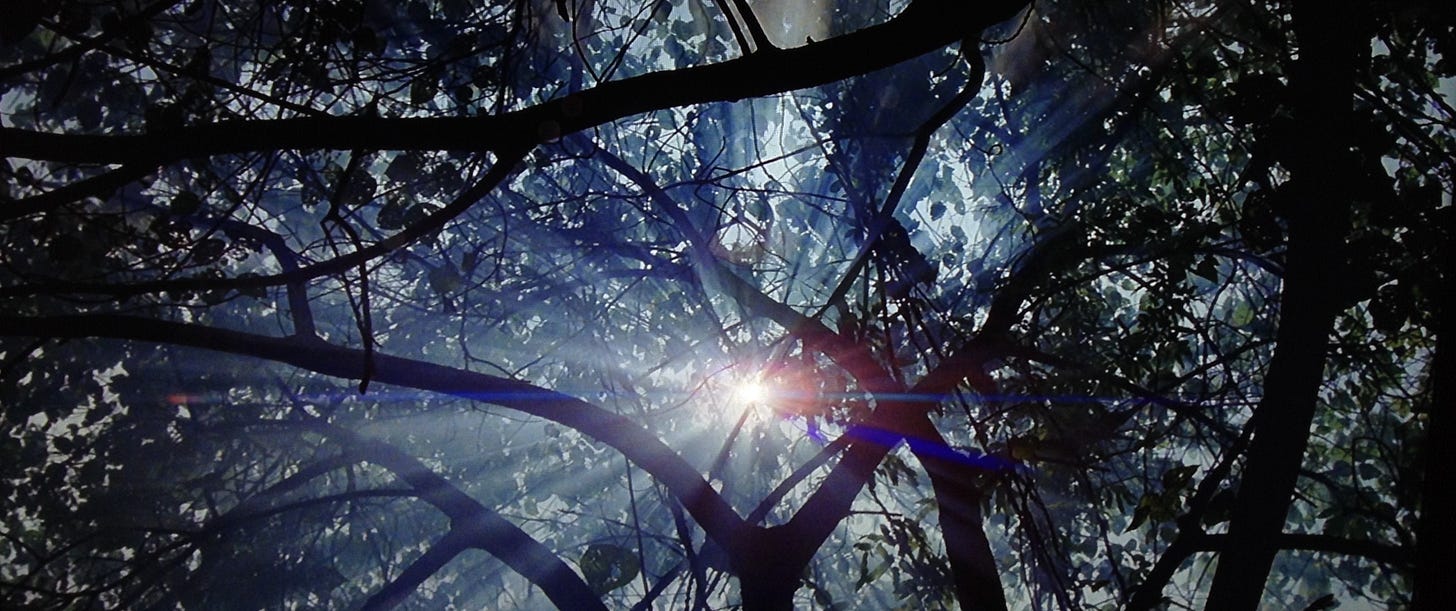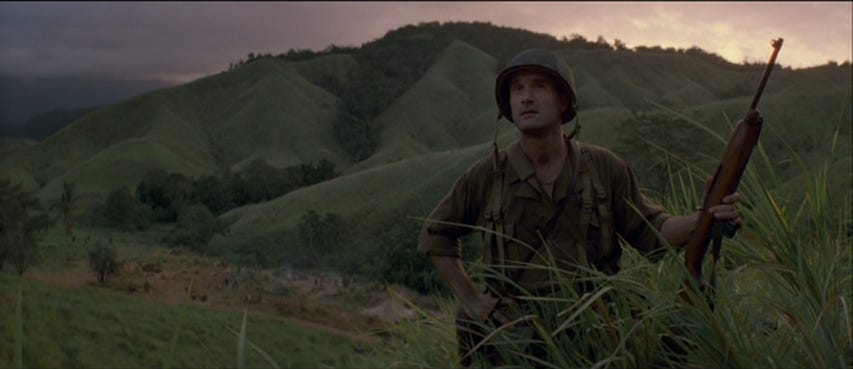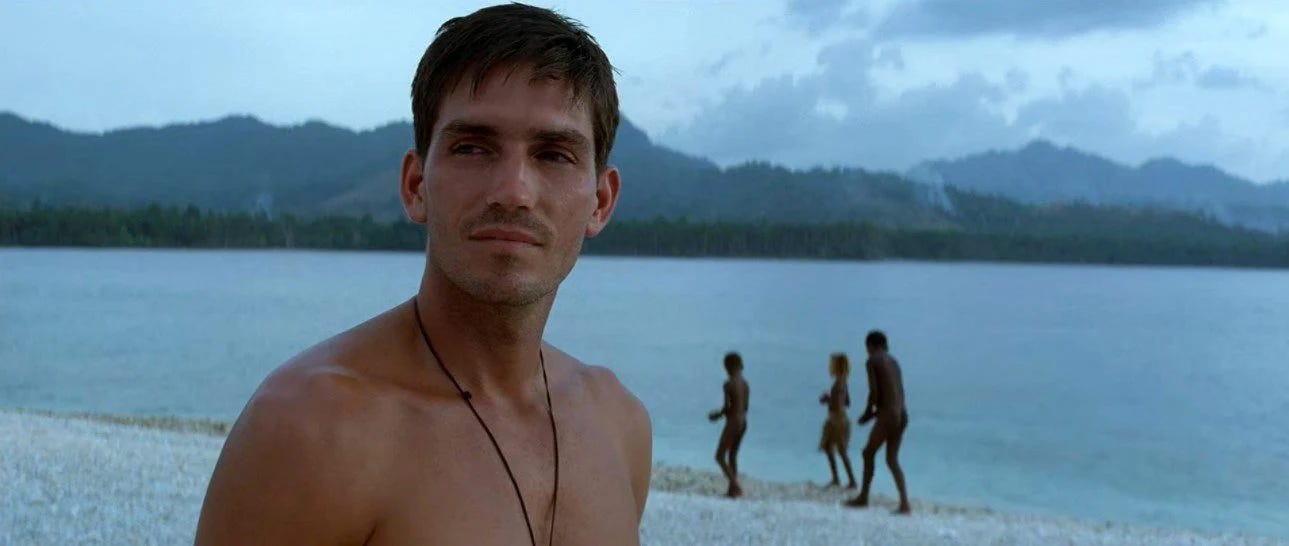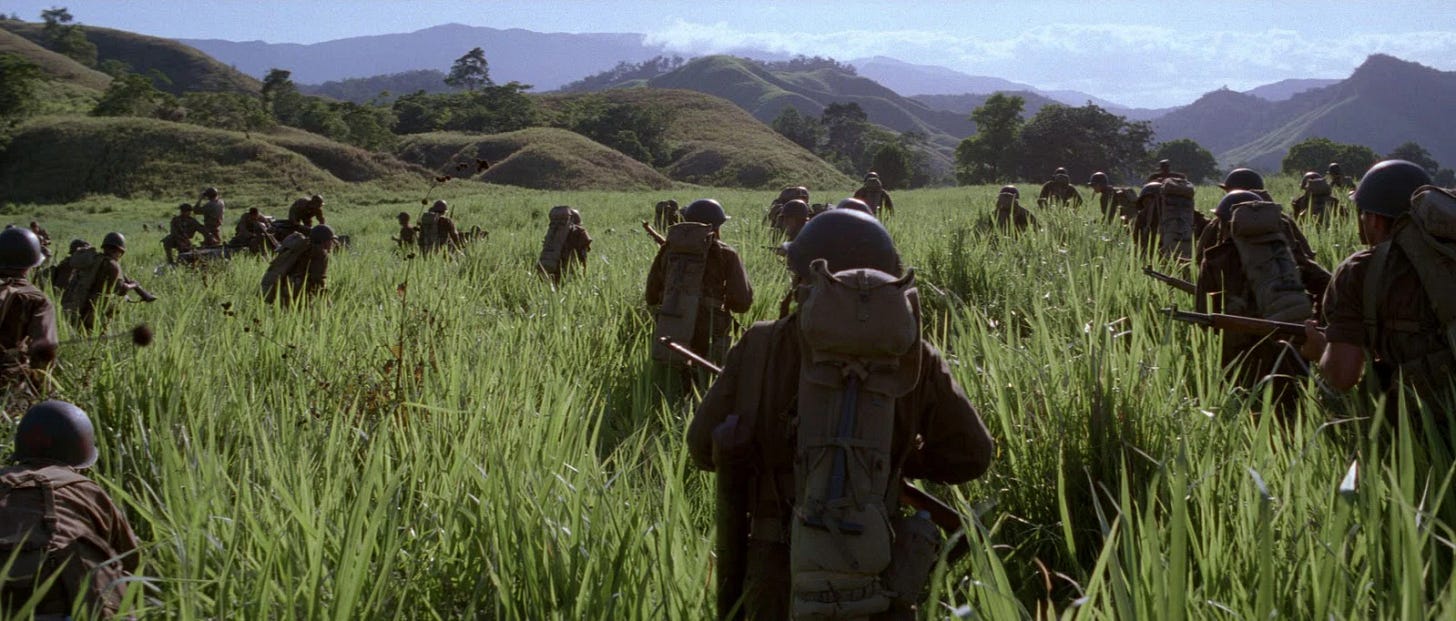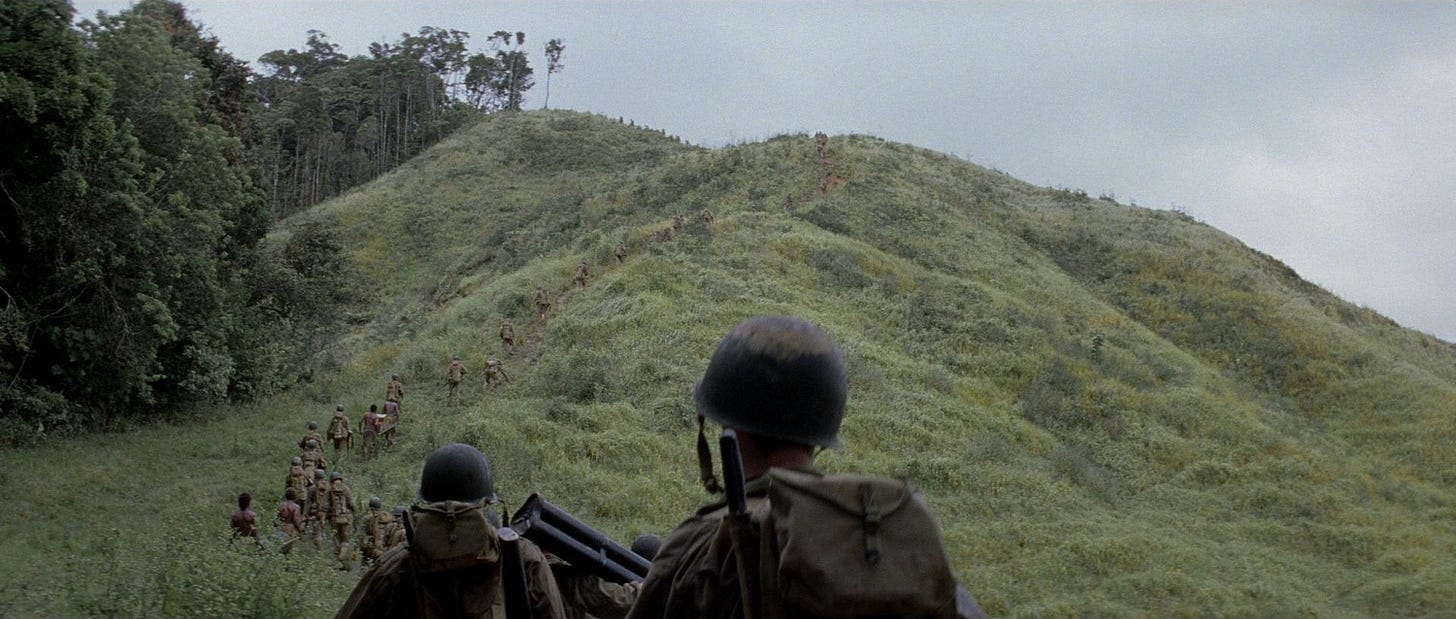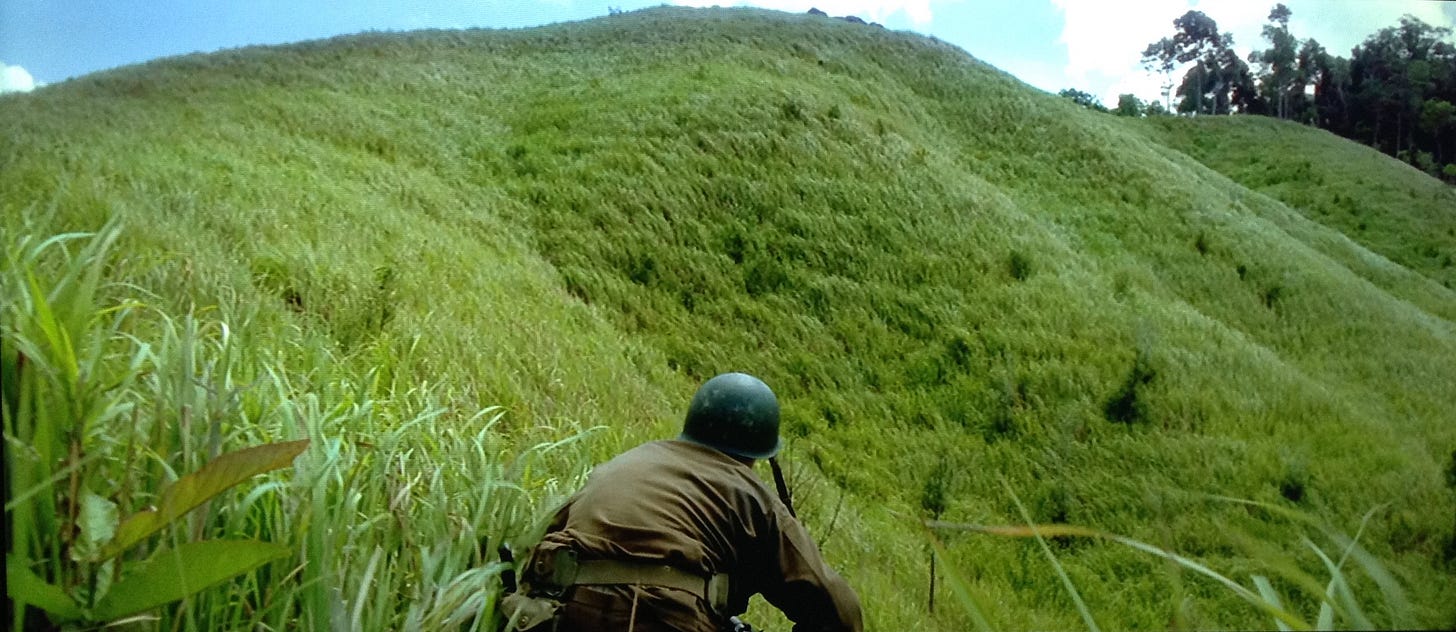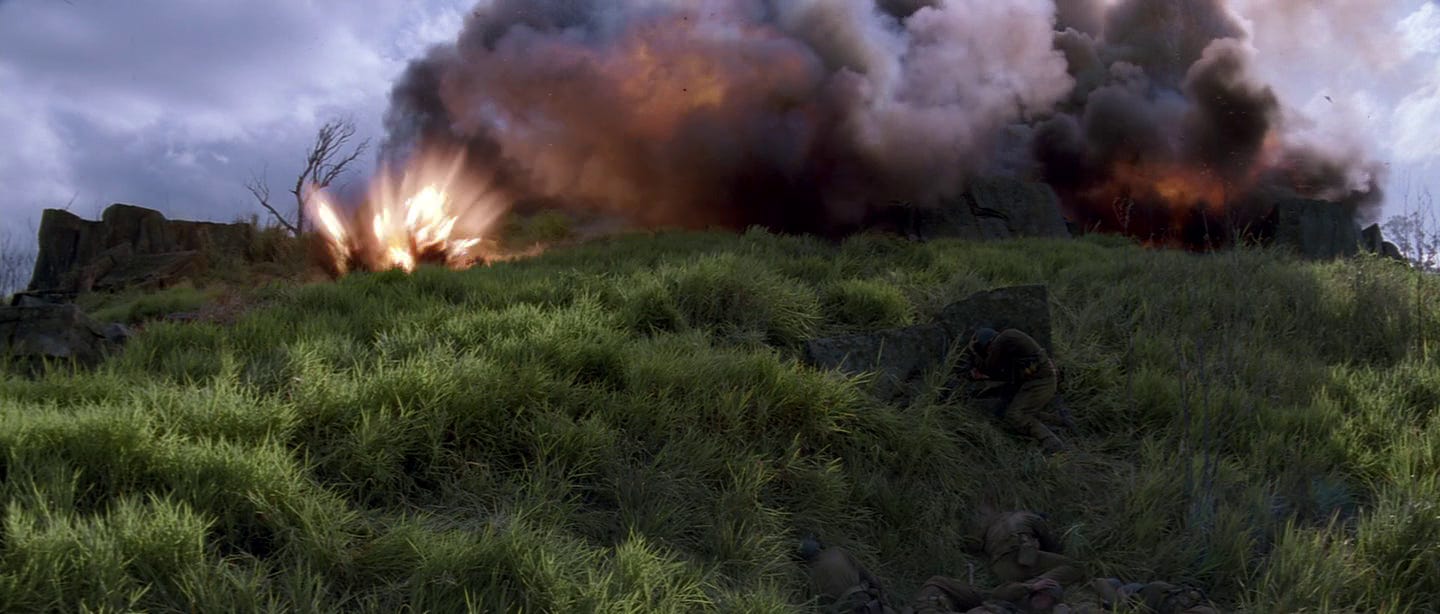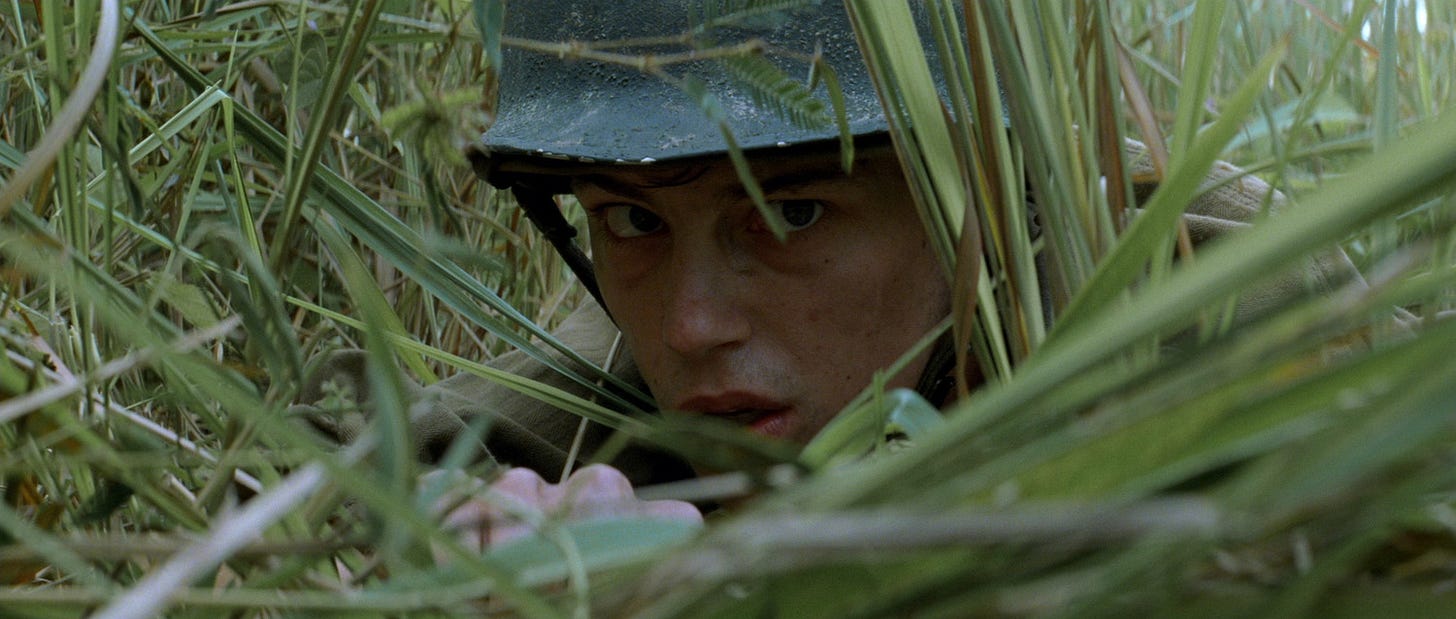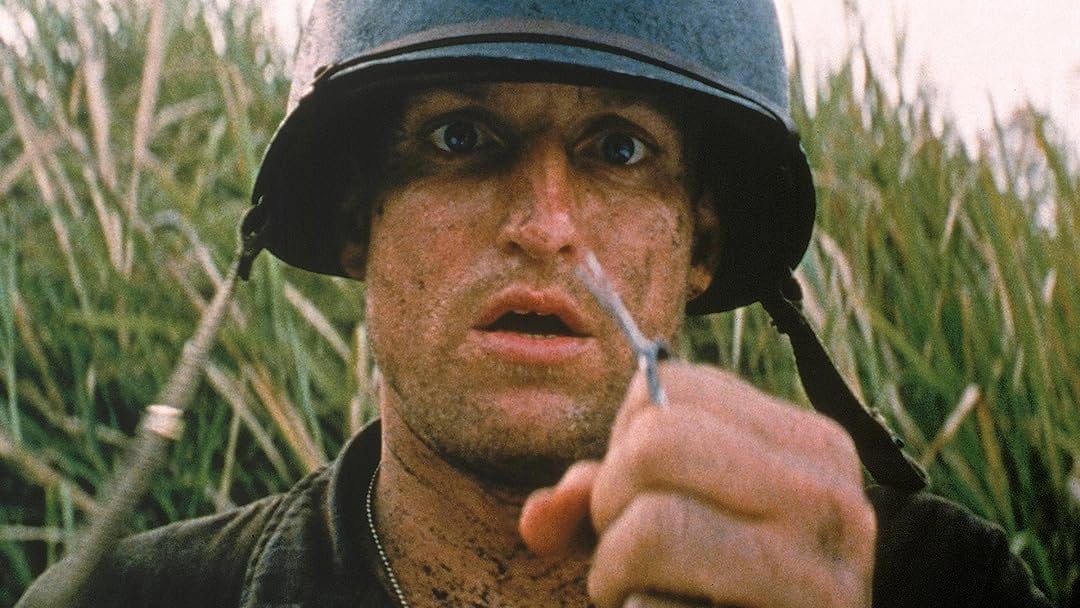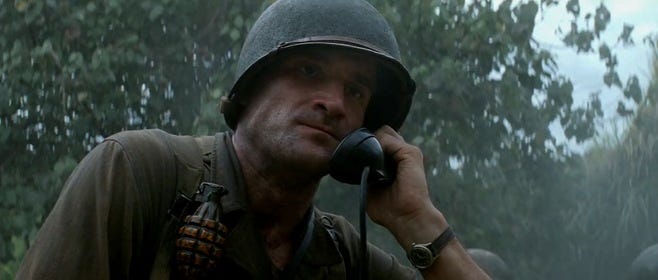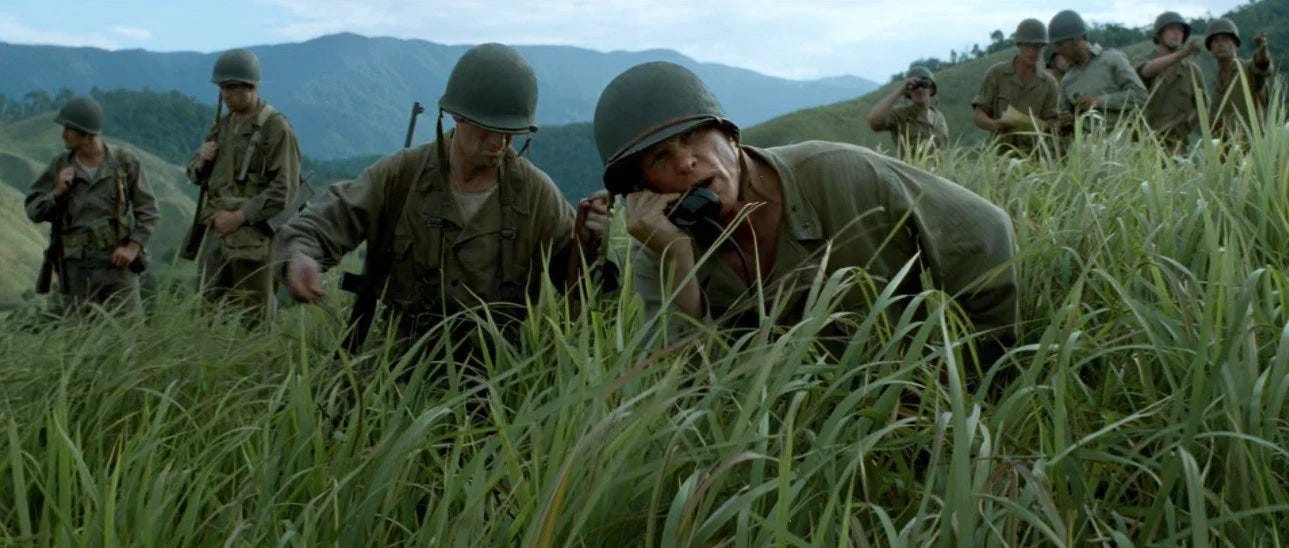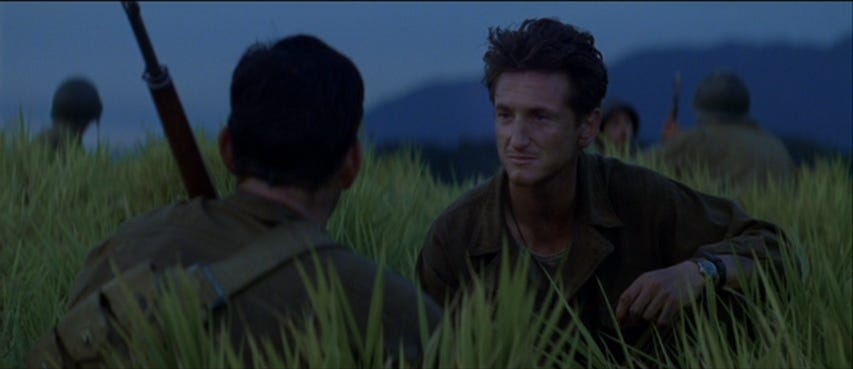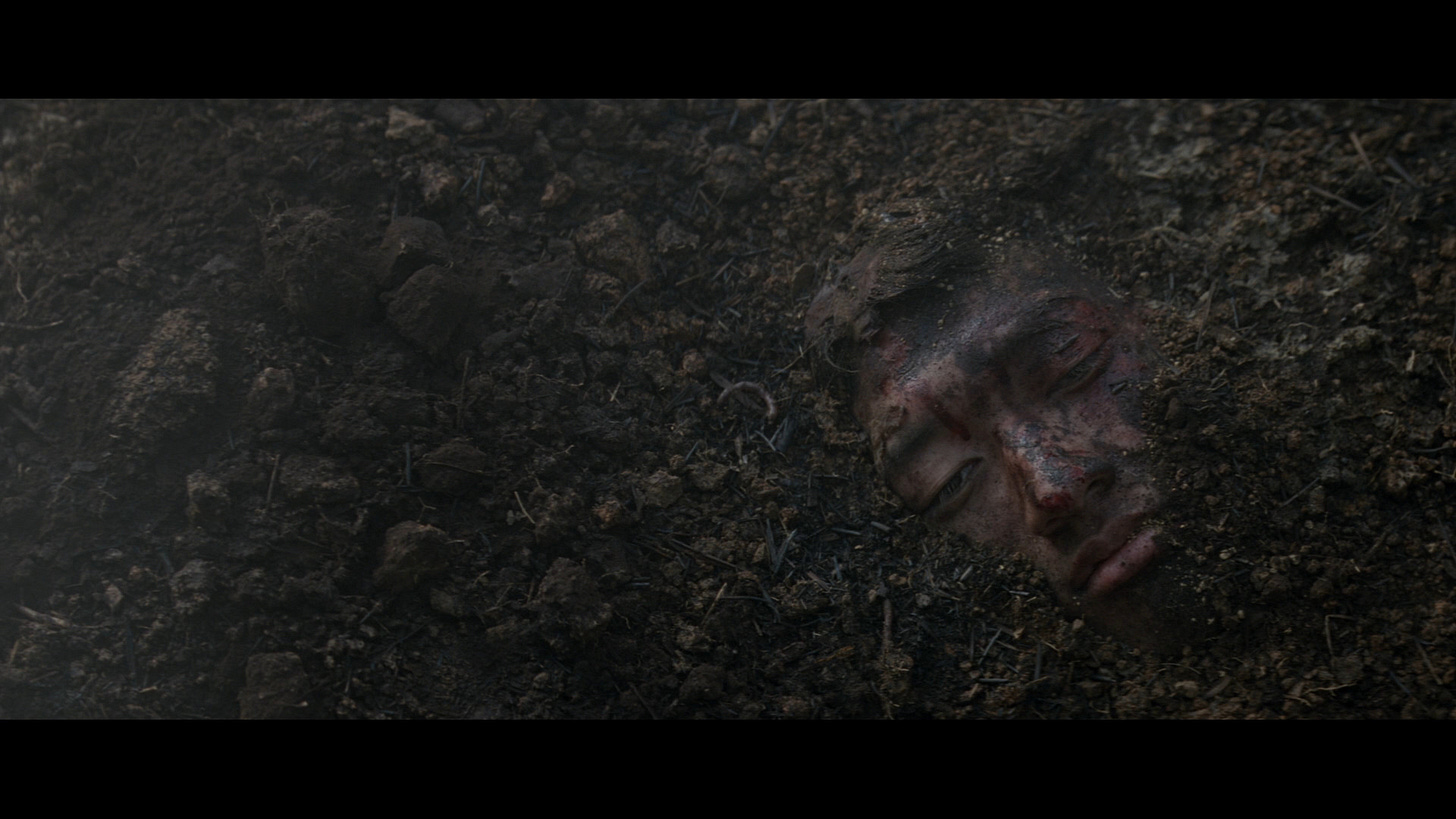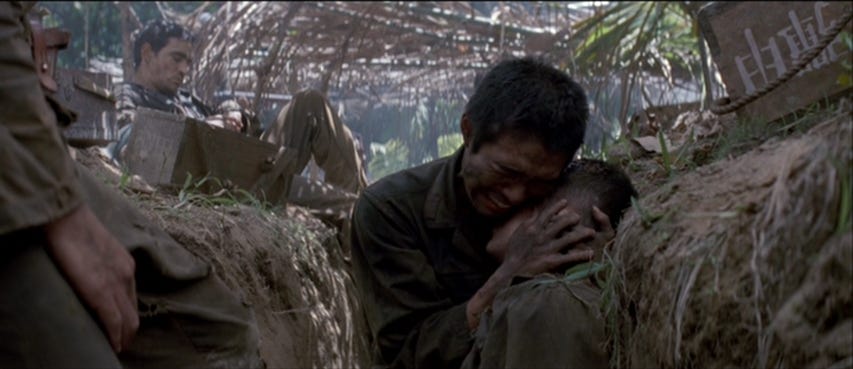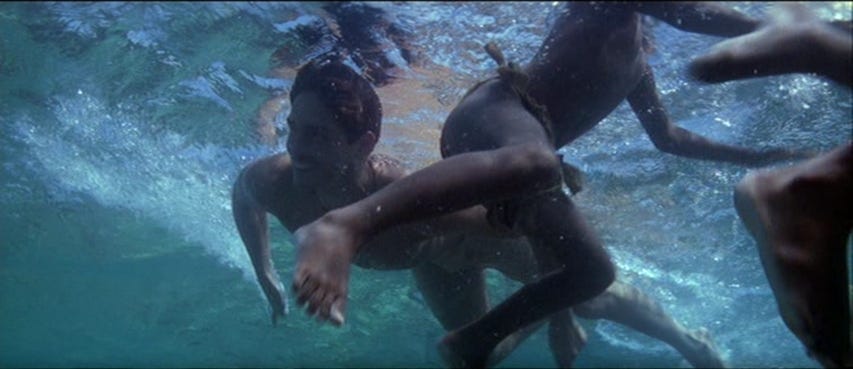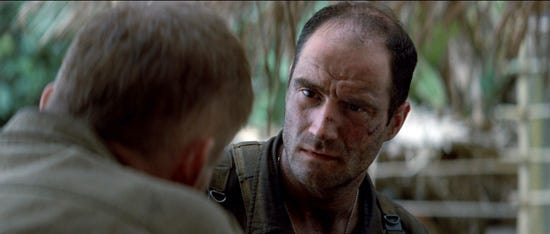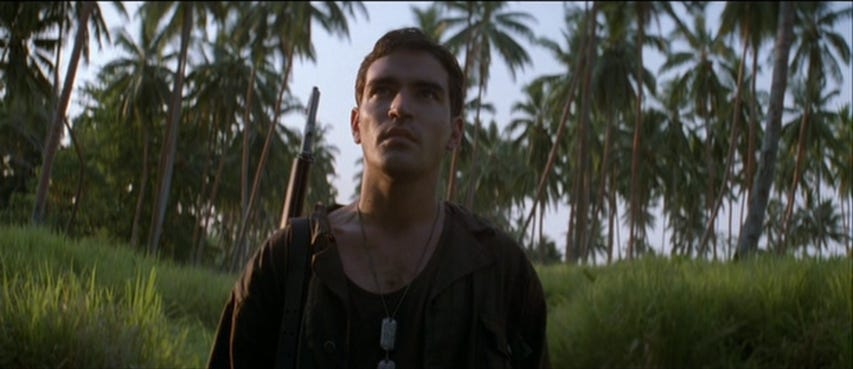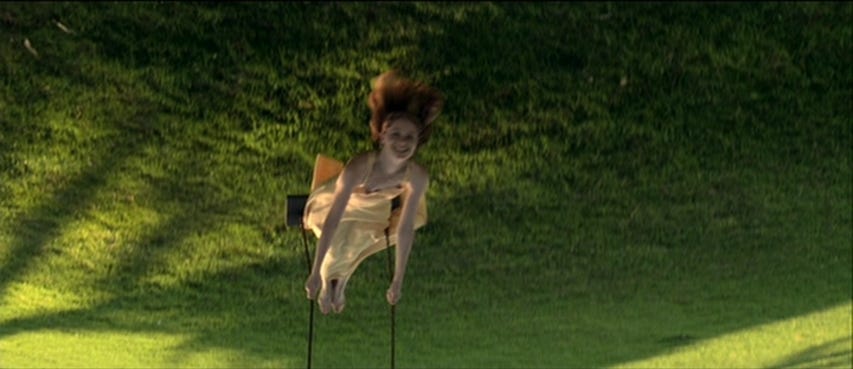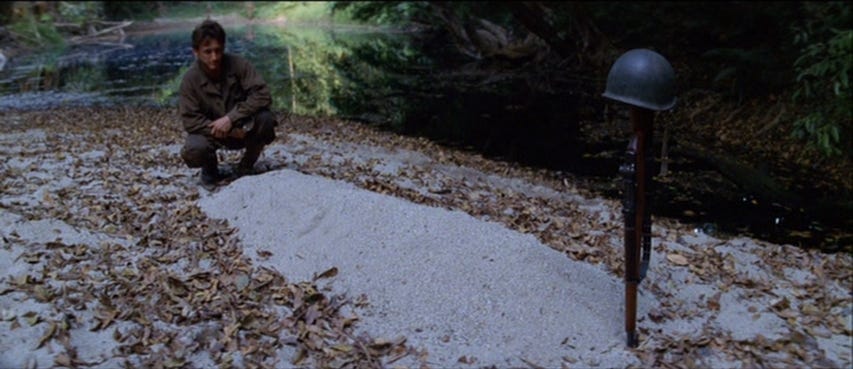The Thin Red Line
Synopsis and analysis of Terrence Malick's 1998 transcendental war film The Thin Red Line. *Spoiler warning*
“What’s this war in the heart of nature? Why does nature veil with itself? The land contend with the sea. Is there an avenging power in nature? Not one power, but two?”
The Thin Red Line isn’t concerned with the winners of the fiery Pacific theater Battle of Guadalcanal. It’s focused on the moral and spiritual struggles of the soldiers. Rather than being pro-America propaganda or a triumphant war film, it is an artistic expression. One that is built on internal monologues, shocking violence, and poetry. Despite being victorious in battle, it’s evident that the men are deeply traumatized.
Soldiers have written poetry for centuries. This artistic expression is one way for them to process their trauma without the hypermasculine facade they have built to survive in war. In the film, soldiers connect one-on-one to philosophize the meaning of life. But in these conversations, they are only a fraction of their true self. It’s not until the inner monologue narration that you truly understand each soldier's moral qualms. The soldiers gently and stoically contemplate death through elegant writing.
The times when Private Witt goes AWOL and lives with an indigenous tribe are so beautiful. Malick shows us the gentle and compassionate side of Witt—a soldier designed to kill. He admires the beauty of nature and their tribe. This model of a loving community is what people should do instead of warring against each other. This changes Witt’s mindset into a blaring philosophical disparity between him and Sergeant Welsh.
“In this world, a man himself is nothing. And there ain’t no world but this one.” - Sergeant Welsh.
“You’re wrong there, Top. I’ve seen another world. - Private Witt.
“Then you’ve seen things I never will.” - Sgt. Welsh
You experience the soldiers preparing for death on the boat ride to invade the beach. Some pray, some nervously talk, and some stare silently with unbearable dread. They storm the island of Guadalcanal expecting Japanese forces, only to be greeted with nothing. This is not only historically accurate but is suspenseful restraint by Malick. This is where the transcendental style of Malick kicks in.
The soldiers are silently walking through the foliage of the island. The audience only hears bugs and birds chirping. There is a very peaceful but juxtaposing moment when Sgt. Storm, played by John C. Reilly, walks by an old indigenous man who slowly walks by the US soldier, completely unafraid. You get used to the relaxing, ambient background noise as the soldiers continue to walk through nature to find their objective: Hill210.
“Who are you who to live in these many forms? You’re death that captures all. You, too, are the source of all that’s gonna be born. You’re glory, mercy, peace, truth. You give calm a spirit, understanding, courage, and the contented heart. - Pvt. Train
With this peaceful rhythm set, the decisive action is imminent. The US soldiers walk toward their objective through 8-foot tall grass fields and steep winding hills. This creates a gentle, serene sense of connection to nature for the soldiers. It’s very peaceful until the decisive action breaks this rhythm when the soldiers silently walk by a dead body. As they get closer, they notice the brutal use of explosives on the human body. A man lies in the grass, decaying, having bled out after both legs were blown off. As the camera pans down, you see a second body killed in the blast. The camera pans up, and you see one soldier crying and others staring in silent shock. They are traumatized but must go on. The peaceful rhythm starts again as the soldiers continue to Hill210 in the morning. Building the rhythm, we must again enjoy the transcendental nature shots for the decisive action to be effective, which comes moments later.
As you gaze at the beautiful hillside, you suddenly hear the distinct sound of descending artillery rounds. The hills light up as large masses of dirt are unearthed in a symphony of explosives and fall like fireworks. This is where Malick’s insistence on natural light and practical effects is so rewarding. The thumping of the rounds against the Earth is haunting as the camera cuts back to the US soldiers waiting for their orders. Some stare into space to disassociate, some cry, some throw up. As the soldiers quietly approach the recently bombarded hillside, you can’t help but be in awe of the scale of nature. The men look minuscule against the grassy hillside. The officer is forced to command the leading soldiers with hand motions to keep moving since they keep stopping in fear of gunfire. The tension is palpable.
This tension is broken as the two soldiers leading the group get hit with sniper fire, immediately killing both. There are a few seconds of silent shock as the soldiers can't believe what they saw. This is followed by a cut to the tall wavy grass fields gently illuminated by the rising sun. It is an angelic, serene cutaway for you to process this killing, similar to how the soldiers did. Once the officer recognizes what has happened, the camera cuts back to the soldier, and he orders his men to charge forward. This would be a grave mistake.
The order to storm Hill210 would be detrimental to the platoon. A barrage of bullets and bombs decorated the hillside, slaughtering US soldiers that were commanded up the hill—the sounds of shots whizzing by and a montage of death. The officers start to realize how catastrophic their mistakes were. The commanding officer Lt. Col. Tail is on the radio and furious, wanting results. In these moments, Cpt. Staros tells himself that his men dying are just children. When the soldiers are off alone, they often take cover from enemy fire. They have brief but impactful moments of a man connecting with nature. These human moments make the approaching death scenes so moving.
Sgt. Keck dies from accidentally pulling the grenade's pin, leaving it to explode on his hip. In a few seconds of heroic action, Sgt. Keck dives away from the battalion to shield the blast from injuring his fellow soldiers. A few soldiers embrace him in death and promise Sgt. Keck that they will write to his wife saying that he died like a man. Sgt. Keck soon passes away, and the soldiers that coddled him are visibly distraught.
The soldiers then argue over who will write the letter to his wife. One man says he only promised to because “you tell them anything when they’re like that.” This upsets the other soldier as he states, “Somebody ought to do it.”
As the men continue, the hellish onslaught rages on. More bullets and more bombs. Lt. Col. Tail can’t comprehend why the battalion isn’t successfully thwarting the enemy. They are naive to the horror of what's happening merely yards ahead. Lt. Col. Tail demands that the soldiers move up the hill, the same thing that killed so many men just minutes ago.
“There is a bunker up there that we can't see, and it’s chewing my men to pieces, sir.” - Cpt. Staros
Despite the numerous shouts and commands for Lt. Col., Cpt. Staros refuses to obey his order to charge up the hill to save the lives of his men. Staros moves on to consul another dying soldier. As he dies, you see flashbacks of combat mixed with ethereal footage of nature.
We are seeing two conflicting philosophies around the value of human life. Lt. Col. Tail wants to use his men as expendable pawns when Cpt. Staros understands they are all young men, not just soldiers of war. This sprawling war epic covers a lot of explosive combat. However, this is much more than an action film. These moments of moral conflict between commanding officers are crucial to understanding why the soldiers have such spiritual journeys. Memories return to the soldiers as their lives flash before their eyes. The Thin Red Line is hauntingly realistic in many ways. The combat was dangerous, but the psychological torture of war may be just as horrific.
“What difference do you think you can make? One single man in all this madness. If you die, it’s gonna be for nothin’. There’s not some other world out there where everything’s gonna be okay. There’s just this one. Just this rock.” - Sgt. Welsh
The next day, the men finally reach the bunker on the hill when the machine gun turret starts firing again. This same gun was chewing up the US soldiers merely hours ago. They had to figure out a way to stop this enemy fire. These scenes feel claustrophobic and haunting, as you can almost feel the bullets and explosions. When the battalion finally clears the bunker, the fire finally stops. We get some moments to rest, the soldiers, and the audience.
There is another scene where moral philosophies clash. The Lt. Col. refuses to give the men water to keep the momentum of the battle going. Everyone is morally and physically exhausted. The soldiers are being barked orders as they stare at the ruins of a village leveled by artillery fire. In a haunting moment, Cpl. Fife sees the face of a dead Japanese man buried under dirt. Cpl. Fife hears him say,
“Are you righteous? Kind? Does your confidence lie in this? Are you loved by all? Know that I was too. Do you imagine your suffering will be less because you loved goodness? Truth?” - dead Japanese soldier
The next battle scene is pivotal close-range combat with many rifle fires and bayonets. It’s a brutal scene with both sides committing atrocities. You don’t care who wins in these moments because everything is horrific. You don’t care that the US is winning. It's a paradoxical and conflicting scene as the US soldiers hold the Japanese soldiers’ lives in their hands with the ability to end it. Pvt. Train philosophizes in his head as he witnesses these horrors:
“This great evil. Where does it come from? How’d it steal into the world? What seed, what root did it grow from? Who’s doing this? Who’s killing us, Robbing us of life and light, mocking us with the sight of what we might have known? Does our ruin benefit the Earth? Does it help the grass to grow, the sun to shine? Is this darkness in you too? Have you passed through this night? - Pvt. Train
After this, Malick brings us back to the beginning when Pvt. Witt is swimming with a group of young indigenous boys as tribal music is played. It’s a quick flashback to remind us of the peace he once had.
Lt. Col. soon approaches Cpt. Staros and tells him he is being relieved of his duty but is being awarded the silver star. He wants to sweep this incident under the rug like nothing happened. The soldiers burn the ruined buildings and move back to base with a victorious feeling. Cpt. Staros soon tells the crew that he is returning to the States and says they’ve been like his sons.
“You are my sons, my dear sons. You live inside me now. I’ll carry you wherever I go.” - Cpt. Staros
“Can’t nothing make you forget it. Each time you start from scratch. War doesn’t ennoble men. It turns them into dogs. Poisons the soul.” - Pvt. Witt
As Pvt. Jack Bell walks through the jungle alone. He recites in his head what he wrote to his wife,
“My dear wife, you get something twisted out of your insides by all this blood, filth, and noise. I want to stay changeless for you. I want to come back to you, the man I was before. How do we get to those other shores? To those blue hills? Love. Where does it come from? Who lit this flame in us? No war can put it out. Conquer it. I was a prisoner. He set me free.” - Pvt. Bell
Bell soon receives a letter from his wife, who writes to him saying she has fallen in love with another man and seeks a divorce. This is a heartbreaking revelation for Bell after thinking of her throughout combat.
Meanwhile, Witt briefly returns to visit the indigenous tribe and notices they have turned irritable and no longer trust Witt. At the film's beginning, Witt noticed that people never fought in the tribe. Upon his return, he sees that fights have become commonplace. The once peaceful and serene tribe has been poisoned by the violence surrounding them.
When Witt returns, he is commanded by a new officer, Lt. Band, to take a patrol boat upriver. Lt. Col. Tail couldn’t get Cpt. Staros to send his men on a suicide mission, so he found someone who will. This ultimately leads to Witt's death and the wounding of many others.
After the firefight on the river, the surviving men bury Witt. Shortly after, they are relieved of their duties and evacuated off the island. Witt was hours away from seeing peace but was tragically killed in a mission they knew was impossible.
On second viewing, The Thin Red Line is one of the greatest films I’ve ever seen. Malick takes the ethereal qualities of the transcendental style of filmmaking while delivering a life-altering war film. Malick’s editing style uses cuts to nature shots to create introspection and emotional processing moments. His angelic use of natural light heightens the mythic feeling of the film. There are endless visually striking scenes. Everyone knows Malick’s use of natural light in Badlands and Days of Heaven. This technique of realistic camerawork makes the war more immersive. The audio mixing is out of this world. If you’re a fan of war films and have an excellent stereo system, The Thin Red Line would be an incredible viewing experience. This immersion makes the ups and downs of battle more emotionally stimulating. You feel an elevating, spiritual sensation that we crave so much from cinema.
Thanks for reading.


